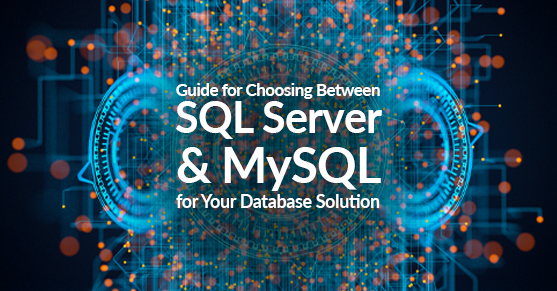When choosing between SQL Server and MySQL for your database product, it’s important to consider several factors, including your specific requirements, data storage and processing needs, and budget. Here is a comprehensive guide to help you make an informed decision.
Acknowledging Your Requirements
Before comparing SQL Server and MySQL, it’s important to acknowledge your specific requirements. This may include the type of data they need to store and process, the size of their database, their expected growth rate, and their budget.
Key Features
SQL Server and MySQL both offer a wide range of features, including support for SQL, transactions, triggers, stored procedures, and replication. However, SQL Server offers more advanced features, such as in-memory data processing, integrated business intelligence, and high availability solutions, while MySQL is known for its scalability, high performance, and open-source nature.
Scalability
SQL Server and MySQL are scalable, but MySQL is known for its ability to handle large datasets without costly hardware upgrades. SQL Server relies heavily on hardware upgrades to handle large datasets.
Security
Both SQL Server and MySQL offer advanced security features, including encryption, access control, and auditing. However, SQL Server offers more advanced security features than MySQL, making it the preferred option for businesses with high-security requirements.
Licensing
SQL Server is a paid software, while MySQL is open-source and free to use. However, some features of MySQL may require a paid license.
Advantages and Limitations
SQL Server
SQL Server Advantages
- Robust features, including in-memory data processing and integrated business intelligence.
- Ease of use, making it ideal for small businesses with limited technical expertise.
- Advanced security features, including always encrypted data and automatic threat detection.
SQL Server Limitations
- Costly, making it less ideal for small businesses with limited budgets.
- Less scalable than MySQL, relying heavily on hardware upgrades to handle large datasets.
MySQL
MySQL Advantages
- Open-source and free to use, making it ideal for small businesses with limited budgets.
- Highly scalable and can handle large datasets without needing costly hardware upgrades.
- High-performance capabilities make it an ideal choice for applications that require speed and reliability.
MySQL Limitations
- Lacks some of the advanced features offered by SQL Server, such as in-memory data processing and integrated business intelligence.
- The steep learning curve requires some level of technical expertise.
Case Studies
Case Study 1: A small e-commerce company with a limited budget and a rapidly growing database chose MySQL for its scalability and cost-effectiveness. MySQL’s ability to handle large datasets without needing costly hardware upgrades allowed the company to grow its database without incurring significant costs.
Case Study 2: A healthcare company with high-security requirements chose SQL Server for its advanced security features, including always encrypted data and automatic threat detection. These features ensured the protection of sensitive patient data and reduced the risk of data breaches.
Conclusion
Choosing between SQL Server and MySQL ultimately depends on your specific requirements, data storage, and processing needs, and budget. While SQL Server offers more advanced features and security, it is costly and less scalable than MySQL. On the other hand, MySQL is highly scalable, cost-effective, and high-performing but lacks some of the advanced features offered by SQL Server. Consider your specific needs and weigh the advantages and limitations of each before making a final decision.
For more information on our SQL Server Virtual-DBA Services or MySQL Virtual-DBA Services, please contact us!

